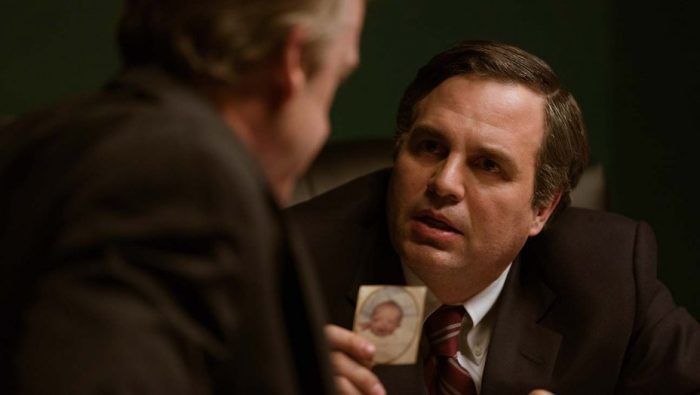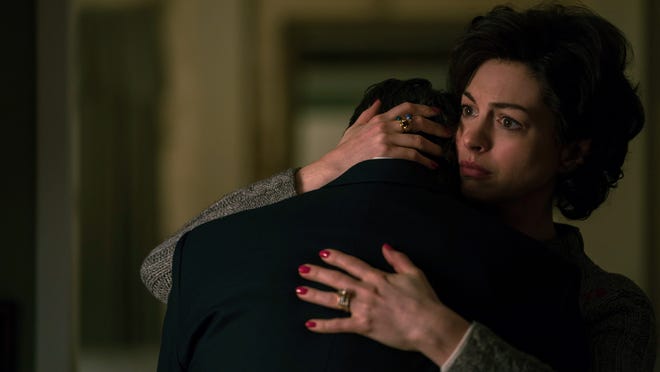For the second straight week, a Marvel star is headlining a motion picture, using their mainstream appeal to promote a smaller project. In the case of Chadwick Boseman, whose 21 Bridges came out last week, we got to see the charismatic star of Black Panther anchor a ’90s throwback action vehicle that played as cinematic comfort food. Mark Ruffalo, both an indie-darling and a huge star thanks to getting quite angry as the Hulk, does the same here, starring (and producing) another throwback to an earlier era (think something like A Civil Action) with the drama Dark Waters.
Ruffalo is not often the leading man, usually giving his best performances in ensemble pieces such as Zodiac, Spotlight, and The Avengers films. The three-time Academy Award nominee is known for his restrained intensity, often providing performances that slowly build up to an emotional release. There is often more going on with Ruffalo’s face twitches and eye movements than in something flashier and overtly emotional. And, in an ensemble setting, that works fine. Why do you need to be loud and unchained when you’ve got Jake Gyllenhaal, Robert Downey Jr, or Julianne Moore around to expertly handle the burden of the spotlight?
Unlike Boseman’s 21 Bridges, Ruffalo’s Dark Waters is definitely a more personal project for the outspoken, progressive actor and since his acting skills are generally more low-key, this might not be the crowd-pleaser many not familiar with Ruffalo’s filmography outside of the Hulk could be expecting. This approach might not sell a lot of tickets but it certainly does its job in performing a public service and that is, in the end, far more respectable and noble than simply cashing in on a popular name. It is the perfect non-cynical synergy of an actor and a studio making a business opportunity out of a tale of morality. In this scenario, no one loses.

Robert Bilott (Mark Ruffalo) is an environmental lawyer rising through the ranks of his firm in Cincinnati, which specializes in defending large chemical companies. One day, the native West Virginian is visited by a begrudged West Virginia farmer named Wilbur (Bill Camp), who knows Robert’s grandmother. Wilbur is adamant that Robert should investigate DuPont, one of the largest chemical companies in the world. Wilbur thinks the death of over 190 cows on his property has something to do with the landfill DuPont has installed next to his farm that may be contaminating the nearby water.
Bilott initially shrugs off the case seeing as DuPont has the potential to be one of his firm’s biggest clients if they ever needed protection from lawsuits, something the firm’s bigwigs, like Tom Terp (Tim Robbins), reminds Bilott of often. But when Bilott begins to read EPA reports and digs deep into DuPont’s history, he discovers a vast conspiracy involving deadly, unregulated chemicals released to the public, not just in West Virginia, but nationwide.
Despite a supportive wife at home (Anne Hathaway) and the beleaguered support from his firm, Bilott begins to make enemies, including the powerful Phil Donnelly (Victor Garber), a chief executive of DuPont, as well as many locals Bilott is trying to defend from exposure (seeing as DuPont is the largest employer in the state). Over decades, Bilott’s fight becomes more intense and the cost of life grows ever larger. It is a journey he may not even survive to see conclude.

True to the real Bilott, Ruffalo portrays him as unassuming and almost frumpy. Bilott serves as the narrative anchor but is not asked to do a lot emotionally as he carries the weight of the world on his shoulders in silence. Ruffalo always looks harried and his ability to roll with the endless punches, without much of an outburst of emotion, allows the two moments Ruffalo needs to explode wonderful and cathartic.
Anne Hathaway and the excellent Bill Camp carry a lot of the emotional weight in Ruffalo’s place, showing how the opposing forces against Bilott are affecting his orbit. With Hathaway, we get to see a woman struggling to support a husband continually in work mode, sometimes sacrificing the time needed to foster real relationships with not only her but their three kids. On Camp’s side, we see the literal effects of poison and exposure on the human body as well as how taking a stand can leave you alone and scared.
Dark Waters is highly stylized, transitioning through multiple decades seamlessly. And the dreary atmosphere certainly amplifies the drama, though without a lot of emotional push in the proceedings, the viewing experience can be murky and cold. Edward Lachman, the director of photography, is a frequent collaborator of director Todd Haynes but also, ironically, shot Erin Brockovich, which is also a true story involving the contamination of water.
Sometimes films have just as much of an obligation to inform us as to entertain us. Dark Waters is certainly entertaining in the typical dramatic sense: we have heroes and villains and morality at play. But its purpose seems more to inform the public of a hidden issue and, hopefully, create more awareness and activism. With Focus Features and Participant Media giving a name like Ruffalo the ability to service the public, we can both enjoy ourselves and become better people. Sure, it might not be as gripping as seeing Hulk smash, but it certainly is more meaningful. Sometimes cinema can’t get any better than that.
Dark Waters is currently in select theaters. A wider release is scheduled for December 6th.




